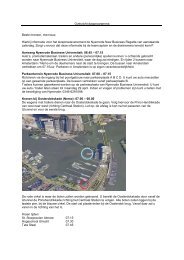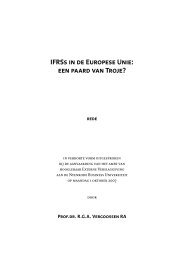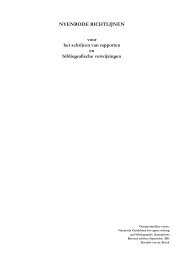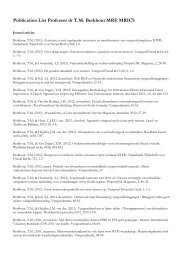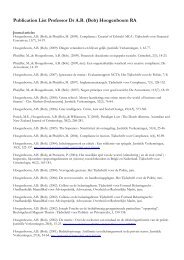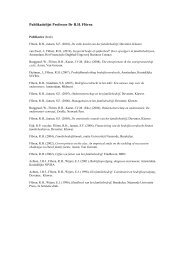pdf - Nyenrode Business Universiteit
pdf - Nyenrode Business Universiteit
pdf - Nyenrode Business Universiteit
Create successful ePaper yourself
Turn your PDF publications into a flip-book with our unique Google optimized e-Paper software.
88 CHAPTER 4. OPPORTUNISM MITIGATION EFFECTIVENESS<br />
4.1 Introduction<br />
The current chapter empirically assesses whether Relative Performance Evaluation reduces<br />
managers’ room for opportunistic behaviour, as argued by Murphy (2001). Murphy claims<br />
that RPE reduces opportunism because RPE makes it more difficult for members of the<br />
organization to opportunistically influence their own performance targets. The tendency<br />
to behave opportunistically is a central tenet in economics-based theorizing about Management<br />
Control. Economic theories provide us with a model of man, who shows self-interest<br />
seeking behaviour with guile (Williamson 1975:255). Opportunistic behaviour is not simply<br />
a theoretical matter but is highly recognizable in actual behaviour. Prior research indicated<br />
that opportunistic behaviour is a realistic human trait. For example, an experimental<br />
study by Maas & Van Rinsum (2011) shows that more than half of the study’s participants<br />
act opportunistically if possible by overstating their performance to maximize their<br />
individual pay-offs. An earlier study by Hannan et al. (2006) provides a similar picture<br />
of participants of an experiment opportunistically misrepresenting their own performances.<br />
The consequences of opportunistic behaviour within organizations can be significant. If<br />
the members of the organization seek their own self-interest and act against organizational<br />
goals (e.g., by shirking or committing fraud), their behaviour reduces organizational<br />
gains. Another manifestation of opportunistic behaviour relates to the determination of<br />
performance targets. Murphy (2001) argues that organizational members often can opportunistically<br />
influence their own target difficulty. For example, if performance standards<br />
are based on prior-year performance, managers can affect their target-levels by avoiding<br />
unusually positive outcomes.<br />
However, according to Murphy’s reasoning, organizations can use RPE to reduce the room<br />
for managerial opportunism. RPE places the determination of the performance target outside<br />
the employee’s sphere of influence, where it is more difficult for the employee to lower<br />
his target difficulty. Under RPE, the performance of the evaluated agent is compared with<br />
the performance of an external reference group of agents. This peer comparison determines<br />
a performance standard to which the agent’s performance is benchmarked. The ‘external<br />
determination’ of the performance target renders it less vulnerable to managerial opportunism,<br />
than performance targets that are determined within the employee’s ‘reach’.<br />
Murphy’s opportunism perspective provides a compelling theoretical explanation for RPE<br />
use. However, the empirical support for this explanation of RPE is limited. Murphy<br />
finds empirical support for his reasoning in a study that does not explicitly focus on RPE,<br />
but on externally determined targets in general. Murphy shows that companies using<br />
budget-based and other internally determined performance standards have less variance<br />
in the bonus payouts and are more likely to smooth their earnings than companies using<br />
externally determined standards (Murphy 2001:245).





